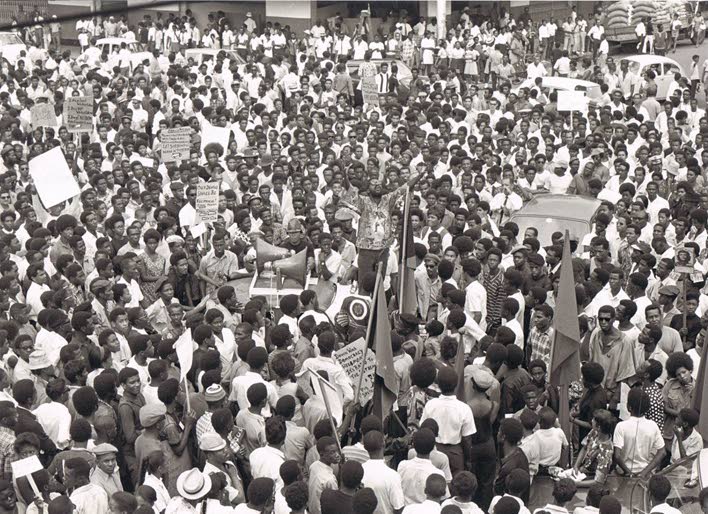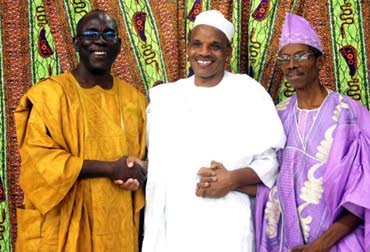NJAC marks rededication day

On December 12, 1970, the National Joint Action Committee (NJAC) hosted a march to rededicate the nation to the creation of a “new and just society.”
This was three weeks after the lifting of the 1970 State of Emergency (SoE) which had been in effect from April 21-November 20.
NJAC supplied the following information in remembrance of the 52nd anniversary of the event.
Rededication Day was a call for a continued commitment to the pursuit of a more humane and just society. It was a call to adopt the principles and values which could drive the process of national transformation. It was indeed a call to the nation to rebuild the strong bonds of brotherhood and sisterhood, which was used to re-define the entire nation as a family.
The love which grew out of this principle led to a 56 per cent reduction in the crime rate in 1970. This still stands as the record for largest percentage reduction ever achieved in the level of crime in any calendar year in Trinidad and Tobago.
It was also a call for a continued opening of business opportunities to a wider cross-section of citizens in the private sector, while providing access to managerial positions in the then-emerging public sector.
December 12 was set as the day on which to remind the national community of the critical need to continue to take control of economic, financial, educational, cultural and social institutions, in order to give true meaning to independence and nationhood. It was a most fervent call for national unity as a foundation principle in the building of any strong and progressive nation.
As we reflect on the significance of rededication day, we must pay our respects and highest tribute to the leader of the TT Revolution, the late Chief Servant, Makandal Daaga, ORTT, who hit the road with public meetings immediately after the state of emergency ended on November 20, 1970, and with due commitment and his characteristic boldness, to mobilise a demonstration of rededication, within three weeks. The government responded with the declaration of a limited, one-month state of emergency, within the confines of Port of Spain, to keep the demonstrators outside of the capital city, while using it as an instrument to deter people from participating in the march.
As we pay tribute to the chief servant, we must also remember and celebrate the resolute role played by NJAC and even more so, the courageous and heroic stand of the TT population, all contributing to a movement which inspired the most significant and transformative period in the history of our little nation.

It was a revolution which also captivated the spirit and imagination of the entire Caribbean, giving rise to the formation of the Caribbean Liberation Steering Committee (CLSC), chaired by Daaga, and which included such distinguished personalities as Khafra Kambon (TT), Eusi Kwayana, regional co-ordinator of the committee (Guyana), Raymond Charlotte, head of the National Liberation Front of Cayenne (or French Guiana), Roosevelt “Rosie” Douglas (who would later become Prime Minister of Dominica), Bobby Clarke (Barbados), Maurice Bishop (later to be Grenada’s PM), Trevor Monroe (Jamaica), Tim Hector (Antigua), and Tony Ferguson, to name a few.
NJAC’s education and enlightenment campaign provided the intellectual impetus which motivated a search for truth in the nation. The fearless commitment of the NJAC to a better society, and its determination to remove the shackles of colonialism which still oppressed the people, inspired the masses to respond with an unequalled burst of creativity and energy, which gave the TT Revolution its appeal and impact.
Within a mere 55 days, NJAC’s mass meetings, demonstrations, circulation of area and national papers and thousands of imported books, aroused a “new consciousness” in TT and the Caribbean. Fusion of this “new consciousness” with the principle of “people’s participation” created a unique People’s Movement, where “The revolution was the people and the people the revolution.”
The masses drove Caribbean-wide changes, which gave 1970 its unique Caribbean character and impact. The People’s Revolutionary creativity drove huge national achievements, during the period which the people’s calypsonian, Brother Valentino, refers to as “the Roaring 70s.” These achievements include:
Governance:
Creation of people’s parliaments, to institutionalise “Power to the People” (the catchphrase of the revolution)
Promotion of the principles of mobilisation, consultation and participation.
Influenced the naming of the 1971 Wooding Constitution Reform Commission, leading to TT’s Republican Constitution in 1976;
National unity
the principle of “unite the nation” was portrayed on March 12, 1970, when 40,000 people answered the call for African/Indian unity in the March to Caroni
Economy:
Growth of state involvement in the TT economy after 1970, from eight enterprises to 67, which opened managerial positions to Africans and Indians
Launch of TT’s first national bank, the National Commercial Bank (now First Citizens) on March 23, 1970,
Localisation of all foreign banks and insurance companies in 1970 (since largely reversed)
Establishment of the National Insurance Board (NIB) in 1971.

Entrepreneurship
Rise of the people’s sector with a major emergence of Indian and African businesses.
The naming of 1970 Small Business Year; 1971 Co-operatives Year; and 1972, Credit Unions Year
A record 1,000 per cent expansion of the capital base of credit unions in the decade of the 1970s.
Equality and justice
A large reduction in racism (in the banking sector, hotels and Tobago’s beaches to name a few)
elevation of nationals in the church hierarchy, such as Clive Abdullah, the first national and non-white Bishop of the Anglican Church in TT (Sept 1970).
Appointment of Francis Eustace Bernard as TT’s first black (African) Police Commissioner.
TT being the first nation outside of the African continent to grant legal status to African religions with the passage of the Act for the Incorporation of the Orisa Movement of TT, Egbe Ile Wa (of 1981).
In the spirit of rededication, NJAC is collaborating with the office of the principal of the UWI and the Sir Arthur Lewis Institute of Social and Economic Studies (SALISES), to host an international conference, the 50th anniversary of the 1970 Black Power Revolution. The event will be held on the April 20-21, 2023, at the Daaga Hall, UWI, St Augustine Campus.
The conference will provide this generation, and our youths in particular, with the very crucial lessons of 1970, which are most relevant to our society today and to our nation’s future.
The most valuable lessons to be learnt from 1970 and spirit of rededication, must be employed in our nation’s quest to create a more harmonious and progressive nation.
“The verdict on a people lies not in their past, or even their present. They will ultimately be judged by the future they create.”

Comments
"NJAC marks rededication day"